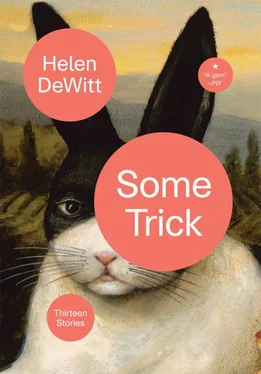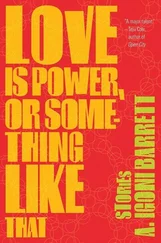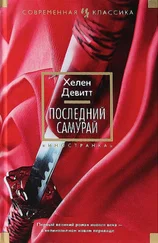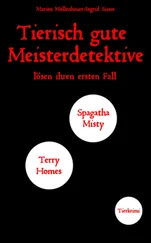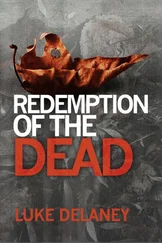‘What shall it be?’ Trevor resumed genially. ‘Shall we go back to my place? Or shall we try a tea shoppe?’
Lily weighed disagreeables: Trevor’s square tea of St Michael’s Tea Assortment, the longer walk to the nearest tea room.
‘The Wykeham’s a bit of a walk, but it’s a nice day.’
‘We’ll go back to my place, then, shall we?’
The easy habit of Trevor’s stride, as he turned down the fork which led out to Norham Gardens by Lady Margaret Hall, reproved the false answer as clearly as his words. Lily was in general more acute, but was distracted by the impression that she was rising, for the first time, to the level at which Trevor’s conversation was pitched. The prospect of scones and sandwiches and cake might have leavened her earnestness; intellectual endeavour seemed only right, however, now that a note of austerity had been sounded, and discussion was to march forward on rations of crumbling chocolate digestives, vanilla sandwich cremes, pink wafers and ginger nuts. ‘We know that he is not — but how do we justify it?’
Alas that the Socratic method should be at times so mal à propos! Trevor was patting his pockets for his keys, he glanced up with a charming rueful smile as they reached the street. ‘Oh, you Americans! Are you ever not philosophical?’
‘Oh, but you started me off! You launched us into aesthetics!’ cried Lily playfully, for the descent to personalities was too marked a change of subject to be missed, and flirtation seemed the only apology for her earlier obtuseness.
‘I strike a generality once an hour, I believe. And then, like a good British worker, I break for tea.’
The tin of St Michael’s Tea Assortment lay open on a low table. A ginger nut and two sandwich cremes reposed, undisturbed, on a plate on Lily’s lap; a plate by Trevor’s side held half a plain digestive, crumbs from whose other half drifted down his delightful tie. Two cups, half-drunk, of Earl Grey flanked the biscuit tin. Half a pot of Earl Grey sat stewing within a red knitted tea cosy.
The scene was, to Lily, a little dreary. Her gaze moved about the familiar room — the dark brown wall-to-wall carpet, the Morris armchairs upholstered in a repeating pattern of a hunting scene in pale brown on off-white, the huge squashy red-and-brown striped sofa on which they were sitting. Snatches of colours, of textures, of patterns she had come across came to mind, like felicitous phrases, fragments of Cicero or Tacitus to the mind of a Latinist glancing through a poor composition. On the walls were a couple of daguerreotypes of Trevor’s great-grandparents (appropriated not without some acrimony from other members of the family); two black-and-white enlargements of photographs of Cretan peasants; a small oil of a young gentleman with his horse, c. 1772, clothes, expression, posture, horse all carelessly comme il faut — a several greats grand-uncle of Trevor (more spoils from family property); and a Dutch genre painting of a woman mending. Lily considered these in relation to the question of kitsch. Trevor leant back into the corner of the sofa, crossed his legs, finished off his digestive.
‘What was that you were saying about Botticelli?’ he asked now benignly, brushing crumbs off his fingers. The modest comforts of the squashy sofa, the St Michael’s biscuits, the Cretan peasants had, it seemed, fortified him for argument.
Lily felt, for her part, somewhat chilled by the largely glum décor. ‘I thought that might work as an example of paintings of beautiful subjects which succeed in being genuinely beautiful themselves.’
‘But it’s precisely the success, isn’t it, that sets them apart? That’s not much of a conundrum.’
‘Well…’ She thought that she could, after all, have spoken more fluently over, say, a plate of scones with clotted cream and strawberry jam. ‘Does that mean, then, that any unsuccessful painting of a beautiful subject must be kitsch? Isn’t there more to it than that? Aren’t there all kinds of mediocre paintings of beautiful things that aren’t, I don’t know, in bad taste?’
‘I suppose it’s the note of sincerity, a sort of shamelessly yearning, passionate sincerity, that’s so damning. It’s embarrassing to watch, isn’t it — like seeing someone in a state of ecstasy with his fly open.’
‘Perhaps that’s it.’
‘So what I was getting at earlier,’ he grinned, ‘was that a state of ecstasy leaves one terribly prone to forget to “adjust one’s clothing”.’
Lily smiled.
‘Can I tempt you to another cup of tea? I’ll make fresh.’
‘Yes, please ,’ she said brightly, and began eating one of the sandwich cremes in the interests of conviviality. The red knitted tea cosy was borne off to the kitchen.
‘I think that’s rather sweet, don’t you?’ He returned to find her standing in front of the young man and his horse. ‘Early Gainsborough has even been suggested. I don’t totally buy that, but it’s nice that the thought is in the air.’
‘Is that based on style, or is there some Gainsborough it might be?’
‘Oh, I don’t know the ins and outs of it. There are far too many, unfortunately, that it couldn’t possibly be — all the really good ones, I’m afraid. But Gainsborough or no, it has a certain charm. Or does family pride make me partial?’
‘Oh no, it’s delightful !’ she cried, for if politeness required assent, a note must be struck of firm conviction if assent was not to sound merely polite.
‘I came by it by rather devious means, which some might say don’t do me much credit — but my trophy more than makes up for the occasional pang of conscience. The pangs, in any case, are far more occasional than is entirely decent. It’s a rather amusing story, though it may shock you — or have you heard it before?’
This was a question which admitted of only one reply, which she promptly gave, as plausibly as a person could who had heard the story twice before.
‘It belonged to my great aunt Sophy,’ Trevor explained, as he returned to his seat and began to pour out. ‘She lived in the same house for fifty years, a big old Victorian monster crammed to the attics with everything she’d picked up over the years — most of it junk. She never threw anything away, and never let anyone else in the family do so either, it was a kind of family joke — if anyone said they were thinking of getting rid of something, it was always the very thing she was looking for. She’d no children of her own, so it was always assumed that her treasures, such as they were, would go to her brothers’ and sisters’ children. Eventually, no doubt, things would trickle down to the great nieces and nephews, but my chances of getting anything worth having were pretty thin. The odds were that I’d get a box of chipped crockery or a pair of mildewy opera glasses. No one imagined for a moment that she’d bother to make individual bequests, so there were understandings about suitable recipients for some of the more interesting items. There was an understanding — a pretty vague one — that Great Great Great Uncle Harry here would go to my cousin Harry, who’d said he fancied it because of the name. I’d seen it on a couple of visits to Great Aunt Sophy, and wanted it, but couldn’t see much chance of getting it.’
‘So how did you get it?’
‘Sheer opportunism! I happened to be staying with some friends down in Sussex one year, and ended by seeing quite a lot of Sophy. (Don’t smile!) I suggested to her that it would be a terrible shame if everything were to be auctioned off indiscriminately. Of course it was highly unlikely, but it worried her. She asked my advice; I suggested that everyone be asked to pick out the items of particular interest to them. She insisted I take my pick on the spot! I allowed myself to be persuaded, and ended by taking home with me the Gainsborough query portrait of Harry. My cousin Harry will hardly speak to me, which is a kind of added bonus — he is probably the most boring man in the country.’
Читать дальше
